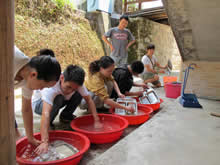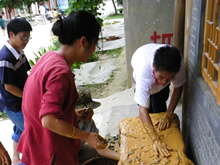By Cheng Ying
The world is changing rapidly during the modern industrialisation process. How should we love our world; how should we respond to countries that are calling for sustainable development? In 2010, PCD’s Guizhou office introduced its “Ecovillage Design Education” (EDE) [1], and began to explore different modes in ecovillage education.
In collaboration with the Field Studies Centre of Guizhou Normal University, we started conducting our first EDE workshop in Guizhou in July 2010. Of the four core pillars of an ecovillage, the ecological, worldview and social programmes, three were conducted , while the local economy programme was carried out next. There were social workers, local activists and staff from Government attending each programme, with altogether more than 20 people joining us each time.
Learning from Nature through the Dao De Jing
PCD has just finished a workshop on the local economy programme in April 2011. A lot of participants expressed sentiments like “this is the most touching training I have ever received”. The reason for the touching response was that the EDE curriculum encouraged breaking away from the usual working boundaries, reflecting on one’s intrinsic values, cultivating one’s inner strength, and crafting a way of living wherein individual beings can live harmoniously with Nature. Most importantly, the new inner strength and intrinsic values were not a direct result of adopting the experience of Western ecovillages. Rather, they emerged from a re-evaluation of the intrinsic value of Eastern culture, and especially the Dao De Jing: “Learn from Nature” is the very essence of the EDE curriculum. Right after the training course, each participant enjoyed reading the Dao De Jing, and all were amazed by the wisdom and livelihood philosophy encapsulated in it.
Many people have asked, “Why are you introducing an EDE curriculum to China?” We feel the question is not why we have introduced the curriculum; instead, what matters is why each participant should participate in this type of programme. One participant quoted a phrase from Thich Nhat Hanh, which is worth sharing here:
“The next buddha may not emerge as an individual, but as a community. A community that practises mutual understanding and loving-kindness; a community that practises mindful living. This is very likely the most important thing we could do for the survival of our Earth.”
References:
The first Chinese version of the EDE curriculum is uploaded: www.gaiaeducation.net
1. The EDE curriculum is one of the training programmes of Gaia Education on the Internet. The curriculum was started six years ago, by educators drawing on the experience and expertise developed in a network of successful ecovillages and community projects across the Earth. More than ten countries are implementing the programme, and it is on the official agenda of the UN Decade of Education for Sustainable Development (UNDESD), 2005-2015.



